Co-Producer & Guest Relations Manager: Kateryna Kyrychenko
Lawyering Peace
Peace negotiations and post-conflict justice pursuits: Behind the Scenes 📹 Hosted by experienced peace negotiator and Founder of the Public International Law & Policy Group, Dr. Paul R. Williams.
Peace negotiations and post-conflict justice pursuits: Behind the Scenes 📹 Hosted by experienced peace negotiator and Founder of the Public International Law & Policy Group, Dr. Paul R. Williams.
Episodes

6 hours ago
6 hours ago
In this episode of Lawyering Peace, Dr. Paul R. Williams speaks with Tyler Thompson about the future of negotiations and the role of artificial intelligence in complex high-stakes processes.
Tyler Thompson is a PILPG Peace Fellow, a peace negotiator, legal advisor, and senior government official with nearly two decades of experience advising on complex negotiations across both public and private sectors. At PILPG, he served as Legal Counsel, directed the Ceasefires Practice Area, and advised state and non-state parties in peace negotiations. He successfully opened PILPG’s office in Libya and led its office in Kosovo. He is now co-founder and Chief Negotiation Officer of Expeditionary, an applied AI research and advisory company reimagining negotiation design and execution.
The conversation explores how negotiation landscapes have evolved, the challenges of high-stakes, multi-stakeholder environments, and how AI can augment, but not replace, human judgment. Tyler walks through lessons from his career, including strategy design, stakeholder mapping, mitigating blind spots, and building trust in conflict-affected and corporate environments. The episode also highlights how Expeditionary, the AI research and advisory company he co-founded, supports intelligence synthesis, coordinated execution, and ethical decision-making in negotiations, while keeping humans central to the process.

Wednesday Feb 04, 2026
MH17 Case and the Long Road to Justice with Dr. Marieke de Hoon
Wednesday Feb 04, 2026
Wednesday Feb 04, 2026
In this episode of Lawyering Peace, Dr. Paul R. Williams speaks with Dr. Marieke de Hoon about the downing of Malaysia Airlines Flight MH17 and the long road to accountability for the 298 civilians murdered on July 17, 2014.
Dr. de Hoon is Professor of International Criminal Justice at the University of Amsterdam and Director of PILPGs Netherlands Office. She has worked closely on legal analysis connected to MH17 and has supported families seeking justice and clarity over more than a decade.
The conversation traces how multiple legal pathways have built a record of accountability, including the Joint Investigation Team, the Dutch criminal trial and convictions issued in November 2022, inter state proceedings before the European Court of Human Rights, and the aviation law track through ICAO, including the ongoing appeal at the International Court of Justice. The episode also explores why truth finding, victim recognition, and a durable historical record matter in an era of disinformation and continued aggression.

Monday Dec 15, 2025
Inside Ukraine’s Displacement Crisis with UNHCR’s Lidiia Kuzmenko
Monday Dec 15, 2025
Monday Dec 15, 2025
This episode of the Lawyering Peace Podcast’s Ukraine Series features an in depth conversation with Lidiia Kuzmenko, Protection Officer at the UNHCR Ukraine Country Office, on the profound human impact of internal displacement during Russia's war of aggression against Ukraine. With more than five million people uprooted inside Ukraine, Lidiia offers expert insight into the daily realities facing displaced families, the legal and administrative barriers they encounter, and the practical meaning of “protection” in UNHCR’s mandate. She discusses challenges related to documentation, housing, livelihoods, and access to services, as well as Ukraine’s evolving policy framework and emerging innovations in supporting IDPs. The episode explores the conditions required for safe and voluntary return, the resilience of displaced communities, and the long term reforms needed to ensure durable solutions. Above all, Lidiia reminds listeners that every statistic reflects an individual story of loss, strength, and determination to rebuild.

Wednesday Nov 26, 2025
Survivor Centered Justice in Ukraine’s Path to Peace with Khrystyna Kit
Wednesday Nov 26, 2025
Wednesday Nov 26, 2025
This episode of the Lawyering Peace podcast focuses on one of the most crucial pillars of peace building in Ukraine: gender equality and the central role of women in shaping a just and durable peace.
Dr. Paul R. Williams speaks with Dr. Khrystyna Kit, chairwoman of the Ukrainian Women Lawyers Association JurFem and expert adviser to the Prosecutor General’s Office on conflict related sexual violence. Drawing on more than fifteen years of legal practice and advocacy, Dr. Kit explains how JurFem promotes gender sensitive legal reform, advances survivor centered approaches to justice, and works with judges, prosecutors, police, and lawmakers to ensure that responses to gender based and conflict related sexual violence reflect the needs and agency of survivors.
Together Khrystyna and Paul explore why women’s participation in decision making is a precondition for sustainable peace, not a symbolic add on. The conversation examines the systemic underrepresentation of women in negotiation and security spaces, the evolution of Ukraine’s National Action Plans under United Nations Security Council Resolution 1325, and the risks of pursuing a quick peace that sidelines accountability, reparations, and human rights. Dr. Kit outlines how peace processes can be redesigned to include women’s rights organizations, survivors, community leaders, and Ukrainians abroad, and why solidarity between Ukrainian civil society and international partners is essential for securing survivor centered justice and preventing a return to violence.

Monday Aug 11, 2025
Inside the U.S.-Ukraine Reconstruction Investment Fund with Henry Scott
Monday Aug 11, 2025
Monday Aug 11, 2025
Can an investment fund become a cornerstone of peace?
In this episode of Lawyering Peace, Dr. Paul R. Williams speaks with Henry Scott, a partner at Milbank and a leading authority on international project finance, about the United States Ukraine Reconstruction Investment Fund, a first of its kind vehicle jointly launched by Washington and Kyiv.
Henry explains how this groundbreaking framework blends in-kind equity, strategic finance, and critical minerals access to drive Ukraine’s recovery. The conversation unpacks the Fund’s hybrid capital model, the role of the US International Development Finance Corporation, safeguards for Ukraine’s sovereignty, and the agreement’s potential to become a global template for development partnerships.
🎧 A timely deep dive into how law, finance, and political will can align to rebuild a nation and why this agreement could reshape the way post conflict reconstruction is funded.

Friday Jul 11, 2025
Friday Jul 11, 2025
What happens when a nuclear power plant becomes a battlefield?
In this episode of Lawyering Peace, Dr. Paul R. Williams speaks with Dr. Dmytro Koval — Co-Executive Director of Truth Hounds and Associate Professor of International Law at Kyiv-Mohyla Academy — about the weaponization of Ukrainian nuclear infrastructure in Russia’s war of aggression against Ukraine.
Drawing on Truth Hounds’ groundbreaking report “In a Nuclear Prison”, Dmytro unpacks how the Zaporizhzhia Nuclear Power Plant — the largest nuclear facility in Europe — has become a site of coercion, forced collaboration, and state-sponsored impunity. The episode explores the blurred lines between civilian and military actors, the role of Rosatom, and why international law must evolve to confront “nuclear terrorism by proxy.”
🎧 A sobering, urgent conversation on legal accountability, nuclear safety, and the need for a 21st-century Geneva Convention for nuclear infrastructure.
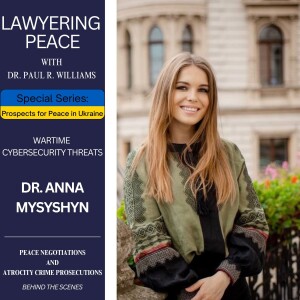
Wednesday Jul 02, 2025
Wednesday Jul 02, 2025
What happens when the battlefield moves online?
In this episode of Lawyering Peace, Dr. Paul R. Williams speaks with Dr. Anna Mysyshyn, a Ukrainian legal scholar and expert in AI ethics, cybersecurity, and digital governance. As the Founder of the Institute of Innovative Governance, Anna has helped shape Ukraine’s legal and strategic response to one of the most digitally complex wars in modern history.
Together, they explore the intersection of emerging technologies and armed conflict — from AI-generated disinformation and deepfakes to cyberattacks targeting Ukraine’s critical infrastructure. Anna unpacks the legal, ethical, and operational challenges posed by these threats and how Ukraine is adapting through regulation, digital resilience, and international cooperation.
🎧 Join us for a vital conversation about truth, technology, and law in the era of algorithmic warfare.
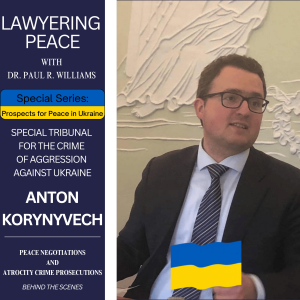
Friday Jun 27, 2025
Friday Jun 27, 2025
What does true accountability look like in the face of unprovoked aggression?
In this episode of Lawyering Peace, Dr. Paul R. Williams sits down with Dr. Anton Korynevych, Director of the Department of International Law at the Ministry of Foreign Affairs of Ukraine and one of the key legal architects of the proposed Special Tribunal for the Crime of Aggression against Ukraine.
Together, they explore the groundbreaking legal and diplomatic efforts underway to establish a new international judicial body capable of prosecuting Russia’s leadership for the crime of aggression — from the choice of model and jurisdiction to the broader international implications for law and justice.
Anton shares his front-line perspective on how this tribunal complements existing mechanisms like the ICC and the ICJ, why it matters beyond Ukraine, and what it signals to complicit states and the world at large.
🎧 Join us for a deep dive into legal innovation, geopolitical accountability, and Ukraine’s path to justice.
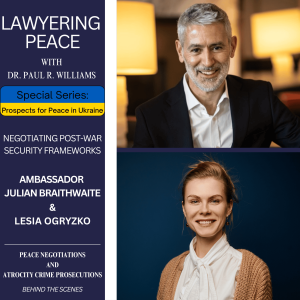
Wednesday Jun 18, 2025
A Post-War Security Framework for Ukraine with Lesia Ogryzko and Julian Braithwaite
Wednesday Jun 18, 2025
Wednesday Jun 18, 2025
What does it take to build lasting peace — and secure it?
What kind of security guarantees can truly deter renewed aggression?
In this episode of Lawyering Peace, Dr. Paul R. Williams is joined by Lesia Ogryzko, Director of the Sahaidachnyi Security Center, and Julian Braithwaite, former UK Ambassador to the UN and WTO, to unpack what a post-war security framework for Ukraine could and should look like.
Together, they explore how to negotiate credible security commitments that reflect the lessons of past failures — while embracing future-oriented strategies for deterrence, resilience, and international coordination.
From the role of the EU, US, and NATO, to the engagement of global players like China, India, and Brazil, the conversation examines how a pluralistic, robust security architecture can emerge from peace talks. The episode also confronts hard realities, including Russia’s continued threats and the challenges of military demilitarization demands.
🎧 Tune in for an expert dialogue on peace, power, and post-war security strategy.
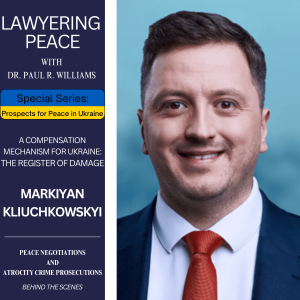
Thursday Jun 12, 2025
Thursday Jun 12, 2025
What does it take to create an international reparations mechanism?How can individuals and institutions contribute to a future justice process—one claim at a time?
In this latest episode of Lawyering Peace, Markiyan Kliuchkovskyi, Executive Director of the Register of Damage for Ukraine, joins Dr. Paul R. Williams to discuss one of the most innovative legal accountability efforts emerging from Russia’s war of aggression.
The Register of Damage is the first formal step in a broader reparations mechanism, designed to collect and record claims for loss, injury, and damage caused by Russia’s full-scale invasion. Though not a tribunal or fund itself, the Register lays the legal and evidentiary foundation for future restitution—whether through confiscated Russian assets or other funding structures.
Kliuchkovskyi explains how this unique mechanism navigates international legal constraints, anticipates huge numbers of claims, and gives Ukrainians a chance to document the losses they have experienced as a consequence of Russia's war. The conversation explores financing options, political momentum, and how the Register’s growing legitimacy helps to ensure that reparations remain a pillar of any future peace.
🎧 Tune in for a timely discussion on law, justice, and the architecture of accountability after war.
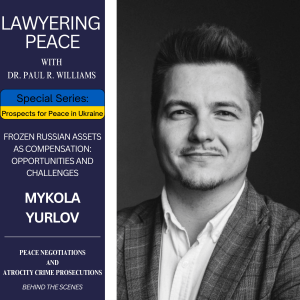
Friday Jun 06, 2025
Friday Jun 06, 2025
What are the legal and political pathways for using frozen Russian assets to compensate Ukraine?
And why has the transfer of these assets become a litmus test for the rules-based international order?
In this episode of Lawyering Peace, Ukrainian diplomat and legal expert Mykola Yurlov joins Dr. Paul R. Williams to discuss how frozen Russian sovereign assets could - and should - be used to support Ukraine’s reconstruction and deliver justice for victims of aggression.
Mykola held the position of Deputy Director of the Department of International Law and Cooperation at the Ministry of Justice, where he led both the International Disputes Unit and the Damage Compensation Unit. In these roles, he contributed to the development of an international compensation mechanism and to Ukraine’s proposal for a special tribunal for the crime of aggression. He also served as Senior Legal Counsel at Truth Hounds, a leading Ukrainian human rights organization documenting war crimes on the ground.
Mykola breaks down the legal foundation for asset transfers under international law, including the use of countermeasures and the principle of state responsibility. He outlines how these transfers would support the three-part international compensation mechanism: the Register of Damage, a future Claims Commission, and a Compensation Fund.
The conversation explores both the legal feasibility and the political resistance surrounding asset transfers, especially debates over sovereign immunity, reversibility, and potential financial precedent. Mykola explains why delay harms not only Ukraine, but the broader credibility of international law.
🎧 Tune in for a timely discussion on law, reparations, political will, and the global implications of frozen asset policy.
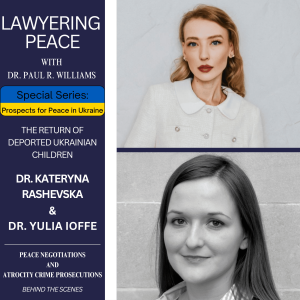
Friday May 30, 2025
Friday May 30, 2025
What does international law owe to Ukraine´s deported children?Why is Russia’s forced transfer of Ukrainian children a defining issue for global justice?
In this episode of Lawyering Peace, Ukrainian international legal experts Dr. Yulia Ioffe and Dr. Kateryna Rashevska join Dr. Paul R. Williams to discuss the illegal deportation of Ukrainian children to Russia and Russian-occupied territories—a policy many argue constitutes genocide.
They examine the strategic, ideologically motivated nature of the deportations: re-education, forced adoptions, name changes, and the erasure of Ukrainian identity. The conversation highlights how this tactic not only breaks international law but also threatens the integrity of the rules-based international order.
Drawing on their legal and advocacy experience, Ioffe and Rashevska reflect on the limits of current enforcement tools, the urgent need for repatriation and reintegration, and how the international community must close accountability gaps. They also explain how the legal response to these crimes could shape the future of child protection in armed conflict more broadly.
🎧 Tune in for a timely discussion on genocide, international law, and the moral and legal imperative to return Ukraine’s children.
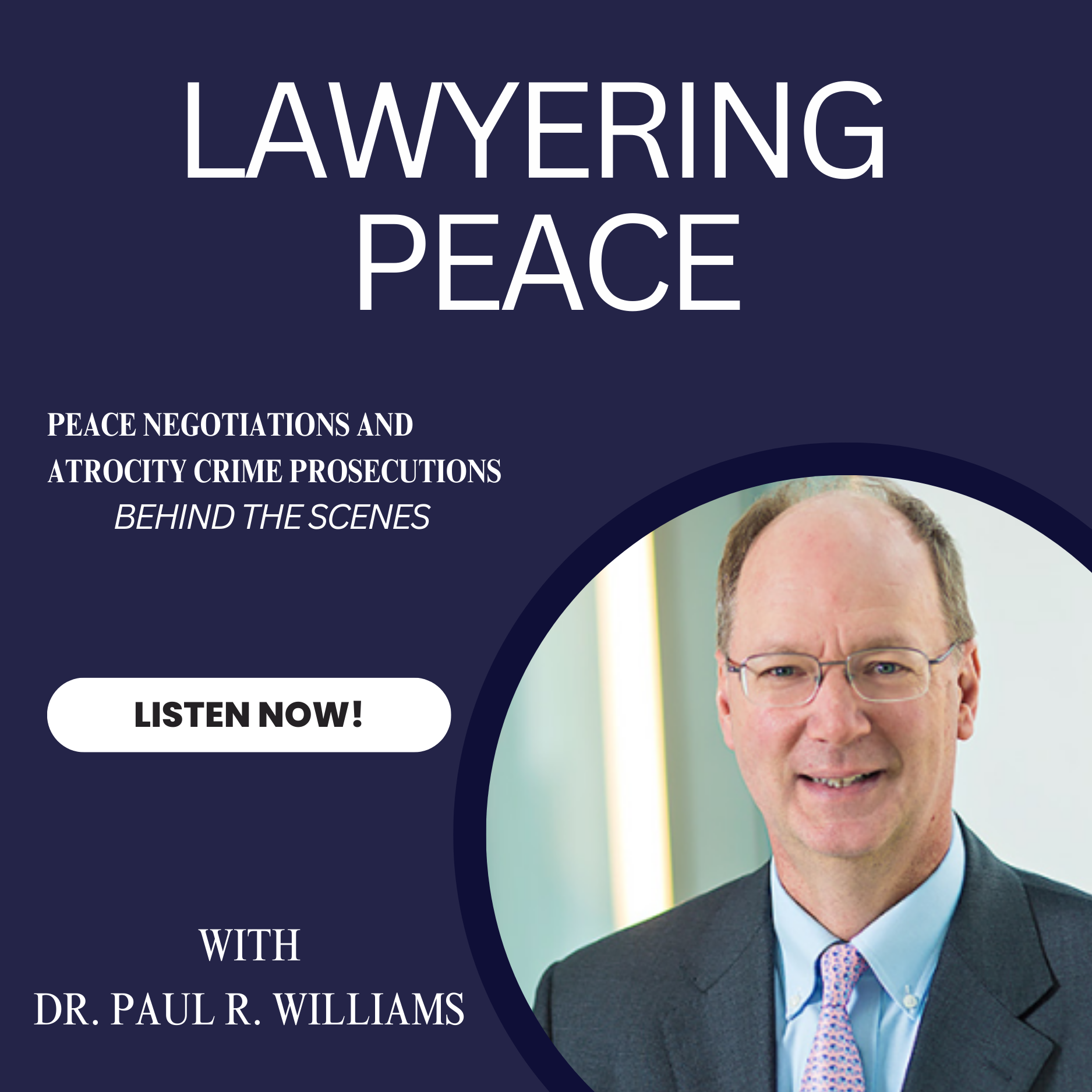
Lawyering Peace Interview Series
Join Dr. Paul R. Williams, as he delves into the realm of peace negotiations, diplomacy, and international criminal justice with guests including seasoned peace negotiators and mediators, legal and strategic advisors, former ambassadors, prosecutors, and veterans of international criminal tribunals. Through the conversations, Dr. Williams and his guests shed light on the hurdles and triumphs of peace talks, the intricacies of negotiation strategies, the rigorous pursuit of justice in the aftermath of atrocities, and, in some instances, the lessons learned from failure. This series is a platform for the insights and wisdom of the friends and colleagues that Dr. Williams has had the honor of working with for over 30 years in the field, and offers an insider’s perspective on the complex dynamics of seeking justice and durable peace on the international stage.
Co-Producer & Guest Relations Manager: Kateryna Kyrychenko








